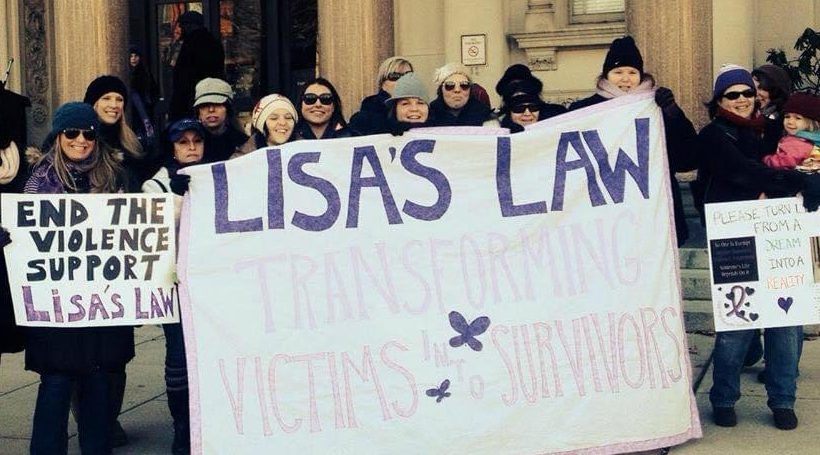Lisa Zindell knew she made the right choice when she called off her wedding just after realizing her ex’s violent behavior wasn’t going to end. After the break up, his erratic behavior increased and Lisa began to fear for her life. Despite taking every precaution – filing a restraining order, changing her routines and staying close to loved ones – the unthinkable happened. On August 13, 2009, just a day after her ex was released from jail for violating the restraining order, he found Lisa and ended her life at 30. Then he killed himself.

Lisa Zindell
Since that devastating day, Lisa’s loved ones have been on a relentless mission to ensure that no one else suffers the same fate. They’ve been advocating for a law that would provide critical protection for victims of domestic violence in similar situations. Fifteen years after her death, they’re hopeful the time has come for Lisa’s Law, designed to monitor dangerous repeat domestic violence offenders and alert victims if their assailants are nearby.
“Lisa did everything right, everything she was supposed to do, but it wasn’t enough. That’s what’s so heartbreaking,” recalls Tara DeLorme, a close friend of Lisa’s from high school. “It was clear to everyone he was a serious threat. The system wasn’t enough to protect her from someone who had nothing to lose.”
“Had she known he was nearby, maybe she could have gotten away or called for help. If the police had realized he was in such close proximity to her, they might have reached her first…”
The bill aims to close the gaps in the current system that left Zindell vulnerable, says N.J. Sen. Troy Singleton, the sponsor of the bipartisan bill. Modeled after successful laws enacted in some 20 other states, it would provide victims with precious time to seek safety.
“Had she known he was nearby, maybe she could have gotten away or called for help. If the police had realized he was in such close proximity to her, they might have reached her first, rather than her being found strangled in the backseat of her car,” says DeLorme. “The idea that Lisa needed just a little more time – maybe just a few minutes – still haunts me.”
The push for Lisa’s Law began shortly after Zindell’s funeral, a day that still haunts DeLorme. She had never before, or since, witnessed such an overwhelming outpouring of pain and grief. Though their friendship had drifted during college, Zindell and DeLorme reconnected as young professionals, reigniting their bond as they both pursued careers in social services. DeLorme working with adults with developmental disabilities, and Zindell helping children in adoption services.
“Lisa was the kind of person who made everyone feel like they were a friend,” recalls DeLorme, who formed Lisa’s Light Foundation shortly after that unforgettable funeral. “She was kind, giving, always smiling. She was driven, just about to finish her second master’s degree, and had recently been promoted to a supervisor in the adoption unit. She was really starting to rise in her career. But even though she did everything right – it was clear to everyone her ex was a serious threat.”
Lisa’s Light started as an effort to channel grief into something positive to help victims of domestic violence, says DeLorme. “It was really important to me to come up with a measure that was proactive, fair and would work. Something that every time it saved a life, it would be for Lisa.”
A version of Lisa’s Law was introduced shortly after her friend’s passing. The bill sailed through the state legislature, gaining significant support from lawmakers and advocates alike. However, Gov. Chris Christie vetoed it in 2012, citing issues with the technology, and again in 2016 under similar grounds.
Gov. Christie’s veto was a major setback, says Singleton, who has championed the bill since before his election. “He argued that the technology wasn’t reliable enough and could give victims a false sense of security. But that reasoning was hard to accept, especially since the same technology was already being used effectively, like monitoring sex offenders under Megan’s Law.”
Over the years, the measure has been refined, incorporating feedback from key stakeholders like the Administrative Office of the Courts and the Attorney General’s Office, he notes.
“This isn’t the same bill that was on the governor’s desk years ago,” Singleton says, noting that both the New Jersey Association of Chiefs of Police and the New Jersey Coalition to End Domestic Violence now support it. “We’ve made it better. We’re confident that we now have a good bill here, and we’re hopeful it will gain passage.”
In its current incarnation, the measure would monitor dangerous domestic violence offenders and alert victims if their assailants are nearby. Considered a pilot program, it will only be enacted in Ocean County. After four years, the program would be evaluated for potential statewide implementation.
For Singleton, the fight is deeply personal. His wife was a college classmate and sorority sister of Zindell.
“Literally, it was one of the first bills I signed onto when I came into the legislature in 2011,” he says. “I made a commitment that I would see this through to both Tara, who I got to know through this process, and to Lisa’s family. Every year, I’ve fought to get this over the finish line.”
“Unfortunately, domestic violence has touched my family as well,” he adds. “I know how difficult it is, and when you compound that with the loss of life that’s associated with it, it becomes even more urgent. We have to do everything we can to turn more victims into survivors.”
And although she would prefer to see the law enacted immediately instead of waiting for the results of the pilot program, DeLorme says if this is what needs to happen, she’s ok with it.
“I would love to see this go statewide right away,” she says. “But I’m ok with starting in Ocean County because I know the numbers won’t lie. We’ve seen similar laws work in other states, and there’s no doubt in my mind that Lisa’s Law will do exactly what we aim for it to do – save lives.”
“I still feel the same way I did the first day,” DeLorme adds. “Time goes by, but it doesn’t change because for me, it stays fresh. I’m still seeing articles about how this continues to happen. I talk to other families who lost a loved one who might have been protected by Lisa’s Law. Lisa’s family is still living with the loss, and I want to make sure that something good comes from all of this.”

NJ Senator Troy Singleton and Tara DeLorme
About Lisa’s Law
Bill S1385, known as Lisa’s Law, aims to establish a $2.5 million four-year pilot program in Ocean County to electronically monitor domestic violence offenders convicted of violating domestic violence restraining orders. The program would notify victims if their assailants came within a certain proximity.
Monitoring would only occur with the victim’s consent. Courts would decide on its necessity based on factors such as the offender’s history, access to firearms and any threats of suicide or homicide.
Steps Needed for Lisa’s Law to Pass
The bill has cleared the Senate Judiciary Committee and now awaits action in the Senate Budget and Appropriations Committee. An identical bill, A3731, also needs approval from the New Jersey Assembly. If both chambers pass the bill, it will go to the governor. The state Attorney General will then oversee the pilot program and evaluate its effectiveness, determining whether it should be expanded statewide.













